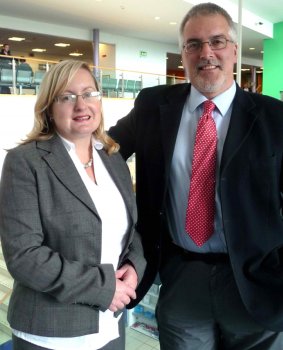
HEALTHCARE research projects must have a clearer grasp of the underlying opportunities to create value for patients and healthcare businesses if they are to continue to attract funding in today’s tough economic climate, according to University of Ulster-led research that focused on the value of medical device research in the UK.
The researchers, from the School of Engineering and the Ulster Business School at Ulster, and the Department of the Public Health, Epidemiology and Biostatistics at Birmingham, have been investigating how the business models used by firms in the healthcare sector are influenced by technological innovation.
The research on the topic was recognised as best paper at the recent Irish Academy of Management conference held in Cork.
The research which is funded by the EPSRC, is part of the UK wide Multidisciplinary Assessment Technology Centre for Healthcare (MATCH) initiative and is aimed at obtaining a better understanding of how safe and effective healthcare technology can be made available more quickly for the benefit of patients.
MATCH researcher Dr Shirley Davey (pictured), who received the award on behalf of the team, highlighted the importance of creating frameworks for understanding the dynamics of businesses that operate in the healthcare sector.
Dr Mike Brennan, senior lecturer in Strategic Management at the Business School said:
“Businesses based on the interface between Life Sciences and Engineering are incredibly important for creating innovations that solve fundamental challenges facing society – especially given the renewed pressure to demonstrate real value for patients”
The truly interdisciplinary nature of the MATCH research collaboration was highlighted by both Professors Brian Meenan (Engineering) and Rodney McAdam (Business School).
Professor Meenan welcomed the award as recognition of the fresh perspective that business methodologies can bring to the study of emerging healthcare technologies:
“Value in Healthcare is typically expressed through the discipline of Economics and commonly focuses on the cost of the technology and the associated clinical benefits it provides, the so-called cost-benefit analysis.
"Our novel interdisciplinary research is using a real world case study-based approach to build up an understanding of how medical device companies operate at the micro level.
"This is incredibly valuable for understanding in detail how healthcare technologies actually reach the market. Such information can then be used to help create faster commercial routes to the clinic”
Professor Rodney McAdam said: “From a business perspective, any research that adds to our understanding of this important, and fast growing sector, should be welcomed.”
Notes for editors
MATCH is a research collaboration between the universities of Ulster, Brunel, Birmingham and Nottingham in healthcare technology assessment, It is funded by the UK Engineering and Physical Sciences Research Council (EPSRC) as a centre of excellence in its field, having been awarded the status of Innovative Manufacturing Research centre (IMRC).
MATCH aims to support the healthcare technology sector and its user communities by creating methods to assess value from concept through to mature product and by engaging with regulatory bodies.
